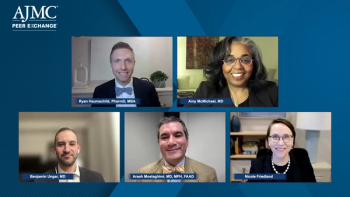
Panelists discuss their final thoughts on the evolving landscape of alopecia areata (AA) treatment, summarizing key takeaways from the discussion and reflecting on future directions for patient care and therapy advancements.

Panelists discuss their final thoughts on the evolving landscape of alopecia areata (AA) treatment, summarizing key takeaways from the discussion and reflecting on future directions for patient care and therapy advancements.

Panelists discuss how the introduction of Janus kinase (JAK) inhibitor therapies will likely change treatment algorithms for alopecia areata (AA), with insights on how payers should plan for coverage in the coming years and explore the biggest unmet needs for patients with AA and potential improvements in care.

Panelists discuss how the Bayesian network meta-analysis showed which Janus kinase (JAK) inhibitors were most effective in reducing Severity of Alopecia Tool (SALT) scores in alopecia areata (AA), highlighting which therapies achieved 50% and 75% improvement, and whether SALT scores are an effective measure of treatment success.

Panelists discuss how the Bayesian network meta-analysis showed which Janus kinase (JAK) inhibitors were most effective in reducing Severity of Alopecia Tool (SALT) scores in alopecia areata (AA), highlighting which therapies achieved 50% and 75% improvement, and whether SALT scores are an effective measure of treatment success.

Panelists discuss the key safety data observed with each of the three Janus kinase (JAK) inhibitors for alopecia areata (AA), highlighting potential adverse effects and how these impact clinical decision-making.

Panelists discuss how ritlecitinib, approved by the FDA in 2023 as the first Janus kinase (JAK) inhibitor for adolescents with severe alopecia areata (AA), offers distinct properties that make it suitable for younger patients, and how its introduction influences treatment decisions and integration into the AA treatment algorithm, while addressing concerns around drug-to-drug interactions.

Panelists discuss how deuruxolitinib, evaluated in the THRIVE-AA1 and THRIVE-AA2 phase 3 trials, differs from previous Janus kinase (JAK) inhibitors in its formulation and efficacy, and why ensuring long-term patient adherence through 24 weeks is crucial for treatment durability and success.

Panelists discuss how the data from the BRAVE-AA1 and BRAVE-AA2 phase 3 trials demonstrated the safety and efficacy of baricitinib, leading to its FDA approval in 2022 as the first systemic treatment for severe alopecia areata (AA).

Panelists discuss how switching therapies in patients with alopecia areata (AA) is often necessary when initial treatments fail, though it can create a cost burden, and how beyond updated guidelines, there are unmet needs such as improved long-term treatments and better psychological support for patients.

Panelists discuss how the high failure rate of conventional treatments for long-standing, extensive alopecia areata (AA) may be due to factors such as disease chronicity and inadequate response to available therapies, and the need for key updates in AA management guidelines, which have not been revised since 2003.

Panelists discuss how adverse events associated with conventional therapies for alopecia areata (AA) are monitored through regular patient assessments, and how these events are managed by adjusting treatment or providing supportive care as needed.

Panelists discuss how adherence to conventional therapies for alopecia areata (AA) can be challenging, with adverse effects often impacting patient compliance, and how the most common cause of nonadherence is the lack of visible improvement or perceived efficacy.

Panelists discuss how key factors such as disease severity, patient preference, and payer requirements influence the choice of initial therapy for alopecia areata (AA), highlighting which drug classes have the highest and lowest success rates.

Panelists discuss how the decision to treat vs observe alopecia areata (AA) depends on factors such as disease severity, patient symptoms, and the use of scoring systems to guide treatment decisions.

Panelists discuss how managing alopecia areata (AA) involves multiple health care specialties, including dermatology and mental health, and how multidisciplinary care can be optimized, while also addressing strategies to alleviate financial barriers that patients may face in accessing treatment.

Panelists discuss how alopecia areata (AA) is included in the differential diagnosis for hair loss conditions and how a definitive diagnosis is made through clinical evaluation and, when necessary, additional diagnostic tests.

Panelists discuss how ongoing or recurrent hair loss in patients with alopecia areata (AA) leads to significant psychological effects, impacting their mental health, and how different forms of AA may be harder for some patients to cope with, with strategies for managing these psychological challenges in clinical practice.

Panelists discuss how alopecia areata (AA) presents with hallmark symptoms such as sudden hair loss, and how the condition fluctuates over time, making it a relapsing or remitting inflammatory disease.

Panelists discuss how the epidemiology of alopecia areata (AA) varies across different patient populations, with certain forms of the disease being more prevalent in specific groups.

Panelists discuss how concurrent comorbidities, such as thyroid disorders and other autoimmune conditions, are commonly seen in patients with alopecia areata (AA) and how they complicate disease management and increase the overall burden on patients.

Panelists discuss how alopecia areata (AA) is a chronic autoimmune disease characterized by inflammation that attacks hair follicles, leading to hair loss and varying disease progression.

259 Prospect Plains Rd, Bldg H
Cranbury, NJ 08512
© 2025 MJH Life Sciences®
All rights reserved.
